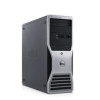Dell Precision 490 Desktop User's Guide - Page 139
Replacing the System Board
 |
View all Dell Precision 490 Desktop manuals
Add to My Manuals
Save this manual to your list of manuals |
Page 139 highlights
Replacing the System Board 1. Transfer components from the existing system board to the replacement system board: a. Remove the memory modules and install them on the replacement board. See Memory for more information. CAUTION: The processor package and heat-sink assembly can get hot. To avoid burns, ensure that the package and assembly have had sufficient time to cool before you touch them. b. Remove the processor from the existing system board and transfer the processor to the replacement system board. See Processor for more information. 2. Set the jumpers on the replacement system board so that they are identical to the ones on the existing board (see System Board Components.) NOTE: Some components and connectors on the replacement system board may be in different locations than the corresponding connectors on the existing system board. 3. Orient the replacement board by aligning the screw holes in the board with the corresponding holes in the computer chassis. 4. Screw in the 9 screws that attach the system board. 5. Replace the heat sink assembly and tighten the four captive screws to secure it to the system board. 6. Replace any components and cables that you removed from the system board. 7. Reconnect all cables to their connectors at the back of the computer. 8. Replace the computer cover (see Replacing the Computer Cover). NOTICE: To connect a network cable, first plug the cable into the network port or device and then plug it into the computer. 9. Connect your computer and devices to electrical outlets, and turn them on. Back to Contents Page















